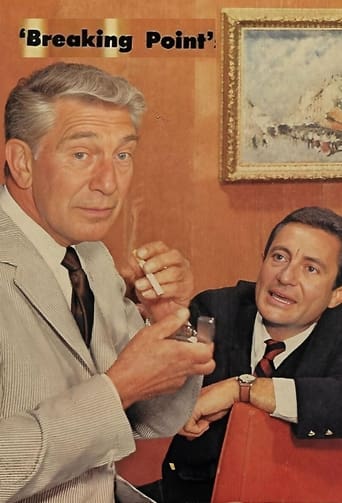Cheyenne-Bodie
Bing Crosby Productions executive Meta Rosenberg (later executive producer of "The Rockford Files") first offered the role of Dr. Ben Casey to Cliff Robertson and Jack Lord before finally settling on Vince Edwards. Edwards gave one of the 60's great series performances as Ben Casey and the series made him a big star. "Ben Casey" was also very well produced with literate, provocative scripts, beautiful black and white photography, and fine guest stars. Meta Rosenberg had gotten Bing Crosby Productions off to a fine start. Next up was this series about a psychiatrist colleague of Dr. Casey. Meta Rosenberg offered the lead in "The Breaking Point" to Cliff Robertson, but he turned her down again. She then offered the role to Peter Falk, who wasn't interested either. Meta then found the perfect candidate: twenty-six year old Robert Redford. Redford might have made the same kind of dazzling impression that Vince Edwards had. But he wasn't interested.Paul Richards finally got the role of the hero psychiatrist, and he was superb. Richards gave one of that seasons most compelling new series performances, along with George C. Scott in "East Side, West Side" and David Janssen in "The Fugitive"."The Breaking Point" was almost as well done as "Ben Casey", and that is high praise.Cliff Robertson guest starred as a young executive compulsively making love to one beautiful woman after another in "So Many Pretty Girls, So Little Time". The script was by Robert Towne ("Chinatown"). Robert Redford was excellent in another episode as an arrogant member of a group therapy session. Marisa Pavan and Jack Weston were also in the group.Rip Torn played a man like "The Great Imposter" who goes from job to job fooling people into thinking he is an attorney or a minister or what have you. Torn tells Paul Richards his next impersonation may be as a psychiatrist. Rip Torn is another actor who could have been fascinating as the hero of "The Breaking Point". Lou Antonio played a sensitive young man whose masculinity is made fun of by his stereotypically hyper masculine brother (Ralph Meeker). Mariette Hartley is a lovely young woman who Antonio is tentatively drawn to. And Meeker may be overcompensating to hide doubts about his own sexuality. Written by Ernest Kinoy.Other fine guest stars included Robert Ryan, Eleanor Parker, John Cassavetes, Joey Heatherton, Bradford Dillman, Kathy Nolan, Anthony Franciosa, Gena Rowlands, and James Caan."The Breaking Point" was on during the 1963-64 season, the same year as "The Richard Boone Show" and "East Side, West Side". A fine year for TV series drama. TV Guide critic Cleveland Amory said the most letters he got that year complaining about fine shows being canceled was for "The Breaking Point".Meta Rosenberg also helped develop the marvelous "Slattery's People", where Richard Crenna gave a career changing dramatic performance as a hard nosed but idealistic politician. Bing Crosby Productions was one of the best, classiest production companies of its time. It produced three great drama series as well as "Hogan's Heroes".Meta Rosenberg led an extraordinary life. There is a delightful interview with her on YouTube.
SanFernandoCurt
Psychiatry has always been an iffy sell on television. It's tough to build in the life-and-death drama of medical series - unless, of course, the patient is absolutely bananas, with violent tendencies. "Breaking Point," a spin-off of the hugely popular "Ben Casey," lasted only one season. It's on-the-couch contemporary, NBC's "The Eleventh Hour," didn't do much better, running from 1962-'64.But "Breaking Point" managed to combine good writing with topical subject matter to be a memorable series, however short-lived. Issues like race, the family unit and the modern malaise were nudged at in what was then a unique approach to television drama. And Paul Richards and Eduard Franz were first-rate, insightful actors. Topping it all off was some really quirky casting: In one episode, veteran bad-guy Henry Silva played a priest! Reading through the episode titles here at IMDb makes me wish I'd seen more of them. Have you ever read more clever, poetic TV titles?

